委婉语的认知理据论文
委婉语的认知理据分析
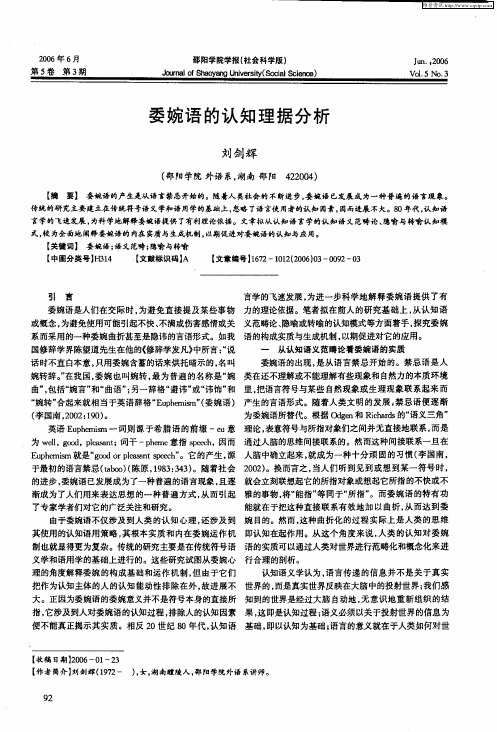
于最初 的语言禁忌 ( bo ( t o ) 陈原,9 3 3 3 。随着社会 20 ) a 18 :4 ) 02。换而言之 。 当人们 听到见 到或想到某一符号时 , 的进步 , 委婉语已发展成为了一种普遍的语言现象 。 且逐 就会立刻联想起 它的所指对象或想 起它所指 的不快或不
大 。正因为委婉语的委婉意义并不是符号本身的直接所 知到的世界是经过大脑 自动地 , 无意识 地重新组织 的结
指, 它涉及到人对委婉语的认知过程 , 排除人的认知 因素 果 , 这即是认知过程 ; 义必须以关于投射世界 的信息为 语
便不能真正揭示其实质 。相反 2 纪 8 O世 0年代 , 认知语 基础 , 即以认知 为基础 ; 的意义就在于人类如何对世 语言
将“ 等同于“ 所指” 。而委婉语 的特有功 渐成为了人们用来表 达思想的一种普遍方式 , 从而引起 雅的事物 , 能指” 能就在于把这种直接联 系有 效地加以 曲折 , 从而达到 委 了专家学者们对它的广泛关注和研究 。 这种曲折化 的过程 实际上是人类 的思 维 由于委婉语不仅 涉及 到人类的认知心理 。 还涉及 到 婉 目的。然而 ,
其使用的认知语用策略 , 其根本实质和 内在委婉运作机 即认知在起作用。从这个 角度来说 。 人类 的认知对 委婉
制也就显得更 为复杂。传统的研究主要是在传统符号语 语的实质可以通过人类对世界进行范畴化和概念化来进
义学和语用学 的基础上进行的。这些研究试图从委婉心 行合理的剖析。 认知语 义学认为 , 言传递的信息并不是 关于真实 语 理的角度解释委婉 的构成基 础和运作机 制, 由于它们 但 把作为认知主体 的人 的认知 能动性排 除在外 , 故进 展不 世界的 , 而是真实世界反 映在大脑 中的投射世界 ; 我们感
浅谈英语委婉语赏析(一)

浅谈英语委婉语赏析(一)论文关键词:英语委婉语交际功能跨文化交际论文摘要:随着人们交往的日益频繁,英语委婉语作为一种普遍存在的语言现象在人际关系中的“润滑”作用越来越突出;作为一种文化现象,它更是反映着英美国家的价值观念和文化传统,因此了解委婉语对于熟悉英美文化、实现跨文化交际有着重要的意义。
一、引言英语中委婉语(euphemism)一词源于古希腊语。
在古希腊语中,“eu-”的意思是“well(好)”,而词干“-pheme”的意思是“speech,saying(言语)”,“-ism”是一个词后缀,简单地说,euphemism 的意思是“fairspeech(说好话)”。
美国著名作家门肯称委婉语为镀金词(gildedwords),还有人把它说成化妆词(cosmeticwords),这是对委婉语含义和作用的形象描述。
委婉语源远流长,它的产生与语言禁忌有关。
在英国,委婉语的使用至少可以追溯到11世纪。
当时已经有雅词和秽词之分,“雅词”就是英语委婉语的前身。
因此我们说委婉语是一种修辞格,更是一种文化现象,是人们在社交中为了谋求一种理想效果所创造出来的一种适当的语言形式。
二、委婉语的交际功能1.避讳功能由于人们对某些事物或现象的恐惧或是羞于提及,在语言表达时不愿言或是不敢言,由于现实需要,不得不表达此种意思时,便使用委婉语来代替。
宗教方面,对神灵(无论是善还是恶)的敬畏使人们不敢直呼其名。
例如,罗马人称Furies(复仇女神)为Eynebdies(和善者),Erinyes(受尊敬者)。
为避免亵渎上帝,英美人用Golly,Gosh来表示God(上帝)。
死亡是人类的最终归宿,也是无人可以跨越的生命终点。
“死”这个词在东西方文化中历来被视为不吉利的事,因此世界各地关于死亡的委婉语很多。
英语中对死亡有如下表达方式:passaway,gotothewest,beinAbraham’sbosom,climbthegoldenstaircase,gotoabetterplace,expire,gotovisitone’sancestors等。
委婉语的语义认知范畴研究
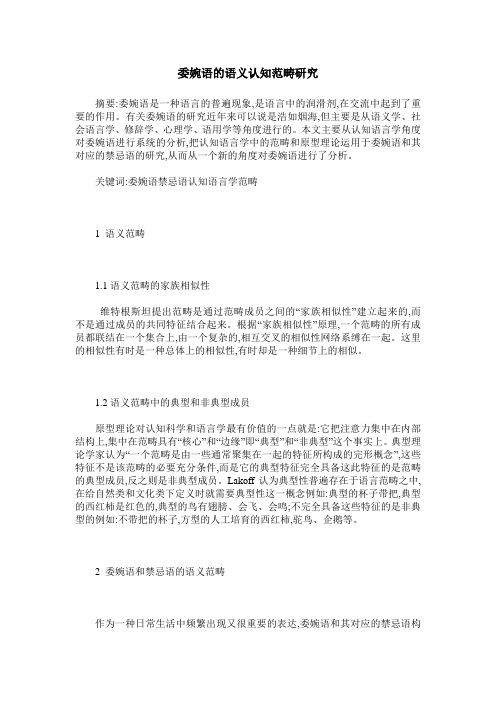
委婉语的语义认知范畴研究摘要:委婉语是一种语言的普遍现象,是语言中的润滑剂,在交流中起到了重要的作用。
有关委婉语的研究近年来可以说是浩如烟海,但主要是从语义学、社会语言学、修辞学、心理学、语用学等角度进行的。
本文主要从认知语言学角度对委婉语进行系统的分析,把认知语言学中的范畴和原型理论运用于委婉语和其对应的禁忌语的研究,从而从一个新的角度对委婉语进行了分析。
关键词:委婉语禁忌语认知语言学范畴1 语义范畴1.1语义范畴的家族相似性维特根斯坦提出范畴是通过范畴成员之间的“家族相似性”建立起来的,而不是通过成员的共同特征结合起来。
根据“家族相似性”原理,一个范畴的所有成员都联结在一个集合上,由一个复杂的,相互交叉的相似性网络系缚在一起。
这里的相似性有时是一种总体上的相似性,有时却是一种细节上的相似。
1.2语义范畴中的典型和非典型成员原型理论对认知科学和语言学最有价值的一点就是:它把注意力集中在内部结构上,集中在范畴具有“核心”和“边缘”即“典型”和“非典型”这个事实上。
典型理论学家认为“一个范畴是由一些通常聚集在一起的特征所构成的完形概念”,这些特征不是该范畴的必要充分条件,而是它的典型特征完全具备这此特征的是范畴的典型成员,反之则是非典型成员。
Lakoff认为典型性普遍存在于语言范畴之中,在给自然类和文化类下定义时就需要典型性这一概念例如:典型的杯子带把,典型的西红柿是红色的,典型的鸟有翅膀、会飞、会鸣;不完全具备这些特征的是非典型的例如:不带把的杯子,方型的人工培育的西红柿,驼鸟、企鹅等。
2 委婉语和禁忌语的语义范畴作为一种日常生活中频繁出现又很重要的表达,委婉语和其对应的禁忌语构成了同一个语义范畴,是同一个语义范畴内的不同成员。
禁忌语因具有该范畴最典型的家族相似性,因而应被视为原型义项成员或典型成员,包含该范畴的全部原型特征,具有最多的区别于其他不同语义范畴的语义属性。
委婉语的家族相似性相对较低,被视为边缘成员或是非典型成员。
从认知语言学看委婉语

从认知语言学看委婉语[摘要]随着认知语言学的兴起,人们开始从认知的角度去研究语言。
本文则主要从心理认知的角度对语言中普遍存在的一种语言现象——委婉语中的四种不同的交际心理进行了探讨与阐释。
[关键词]认知语言学委婉语交际心理一、委婉语概述委婉语来源于希腊语,其意思为sweet talk,是人们谈论那些令人不快或尴尬的事情时,所使用的较为礼貌的说法。
作为一种用曲折委婉的方式表达说话者思想的特殊的语言表达方式,它不直接说出要表达的意思,而是用温和的、含糊的说法取代生硬的话语,含蓄曲折地把人们通常不愿接触、令人不快、厌恶、害怕的东西或一些令人尴尬、难堪、丢面子的事情转化为人们可以接受的语言;作为一种修辞格,它是运用比喻、借代、迂回、缩略等手法来表达生活中那些使人尴尬、惹人不快、招人厌恶和令人恐惧的事物。
其最重要的特征就是以较文雅、悦耳、含糊或委婉的说法代替粗野、刺耳、生硬或直露的说法,以此减少语言表达中的敏感性和刺激性,使交谈双方都达到理想的效果。
综观过去对委婉语的研究,人们主要侧重于对其定义、历史、演变以及语用等方面的研究。
本文则侧重从心理认知方面对委婉语进行探讨与阐释。
二、认知语言学概述20世纪80年代末形成的认知语言学是语言研究史上的重大发展,是一门新兴的从认知的角度研究语言的学科,其被定义为“一个以我们对世界的经验以及我们感知这个世界并将其概念化的方法、策略作为基础和依据进行语言研究的语言学学派”。
它是在反对主流的生成语言学的过程中发展起来的一种研究语言的方法,它采用认知取向、解释取向和共性取向,对大量的语言事实作出了令人信服的解释。
认知语言学者认为语言是心理的表征,是人类认知活动的产物和工具,是思维和认知的结果,语言不是直接反映客观世界,而是有人对客观世界的认知介于其间。
而委婉语作为一种普遍的语言现象,也可以反映出各种各样的社会心理。
从认知研究委婉语,有助于洞察其说话者的心理动机。
三、从认知语言学看委婉语语言的主要功能就是进行交际,委婉语则是取得得体的交际效果的重要策略之一。
浅谈委婉语
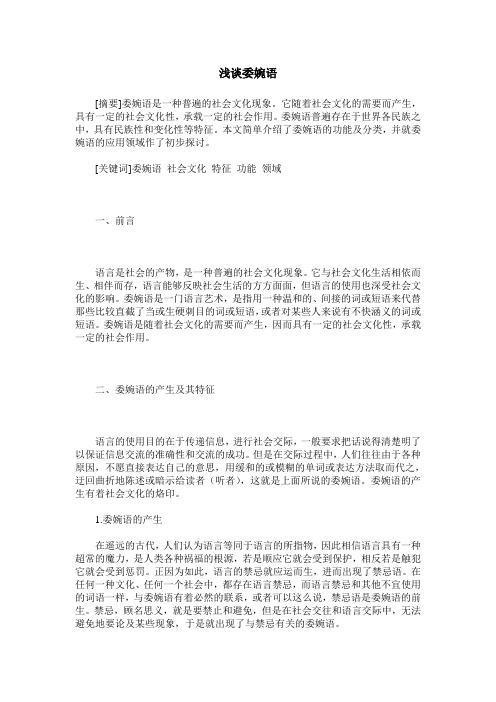
浅谈委婉语[摘要]委婉语是一种普遍的社会文化现象。
它随着社会文化的需要而产生,具有一定的社会文化性,承载一定的社会作用。
委婉语普遍存在于世界各民族之中,具有民族性和变化性等特征。
本文简单介绍了委婉语的功能及分类,并就委婉语的应用领域作了初步探讨。
[关键词]委婉语社会文化特征功能领域一、前言语言是社会的产物,是一种普遍的社会文化现象。
它与社会文化生活相依而生、相伴而存,语言能够反映社会生活的方方面面,但语言的使用也深受社会文化的影响。
委婉语是一门语言艺术,是指用一种温和的、间接的词或短语来代替那些比较直截了当或生硬刺目的词或短语,或者对某些人来说有不快涵义的词或短语。
委婉语是随着社会文化的需要而产生,因而具有一定的社会文化性,承载一定的社会作用。
二、委婉语的产生及其特征语言的使用目的在于传递信息,进行社会交际,一般要求把话说得清楚明了以保证信息交流的准确性和交流的成功。
但是在交际过程中,人们往往由于各种原因,不愿直接表达自己的意思,用缓和的或模糊的单词或表达方法取而代之,迂回曲折地陈述或暗示给读者(听者),这就是上面所说的委婉语。
委婉语的产生有着社会文化的烙印。
1.委婉语的产生在遥远的古代,人们认为语言等同于语言的所指物,因此相信语言具有一种超常的魔力,是人类各种祸福的根源,若是顺应它就会受到保护,相反若是触犯它就会受到惩罚。
正因为如此,语言的禁忌就应运而生,进而出现了禁忌语。
在任何一种文化、任何一个社会中,都存在语言禁忌,而语言禁忌和其他不宜使用的词语一样,与委婉语有着必然的联系,或者可以这么说,禁忌语是委婉语的前生。
禁忌,顾名思义,就是要禁止和避免,但是在社会交往和语言交际中,无法避免地要论及某些现象,于是就出现了与禁忌有关的委婉语。
2.委婉语的特征委婉语具有普遍性、民族性和变化性等特点。
首先,普遍性表现在,委婉语存在于世界各民族之中,无论是在中国还是西方国家,委婉语现象都普遍存在。
由于各国的生存环境大体相似,从某种程度上讲,委婉语还表现出共性,对于事物有大致相同的见解。
委婉语语用功能解读

委婉语语用功能解读一、本文概述委婉语,作为一种独特的语言现象,普遍存在于各种语言和文化之中。
它以其独特的语用功能,使人们在交流过程中能够更为细腻、准确地表达自己的想法和感受,从而避免直接、生硬的冲突和误解。
本文旨在对委婉语的语用功能进行深入解读,以期提升读者对委婉语的理解和运用能力。
本文将对委婉语的定义和特性进行简要概述,明确其在语言交流中的地位和作用。
随后,我们将从多个角度对委婉语的语用功能进行细致分析,包括其在保护个人隐私、维护社会和谐、表达礼貌和尊重等方面的具体作用。
我们还将探讨委婉语在不同语境、文化背景下的运用及其效果差异。
通过本文的解读,我们希望能够帮助读者更好地理解和把握委婉语的语用功能,从而在日常交流中更加得体、有效地运用委婉语,提升沟通效果,促进人际关系的和谐发展。
二、委婉语的基本概念委婉语,作为一种语言现象,广泛存在于各种语言和文化中。
它是指通过使用柔和、含蓄或模糊的表达方式,来替代直接、生硬或可能引起不适的词语或表达。
委婉语的出现,既体现了人们对语言艺术的追求,也反映了社会交往中的礼貌原则和文化习俗。
委婉语的基本特点在于其间接性和含蓄性。
通过委婉语,人们可以更加柔和地表达自己的想法和感受,避免直接冲突和尴尬。
同时,委婉语也可以用来掩饰某些不愉快的真相或敏感的话题,使交流更加顺畅和愉快。
委婉语的形成和发展,与社会的历史、文化、心理等因素密切相关。
在不同的历史时期和文化背景下,人们对委婉语的使用和接受程度也会有所不同。
例如,在一些文化中,直接谈论死亡或疾病等话题可能被视为不吉利或不尊重,因此需要使用委婉语来替代。
而在一些现代社会中,随着人们对平等、尊重和隐私的重视程度不断提高,委婉语的使用也变得更加普遍和多样化。
委婉语是一种重要的语言现象,它不仅丰富了语言的表达方式,也促进了人与人之间的和谐交往。
通过深入研究和理解委婉语的语用功能,我们可以更好地理解语言与社会、文化、心理等方面的关系,为语言交际和跨文化交流提供更加有效的策略和方法。
浅谈委婉语
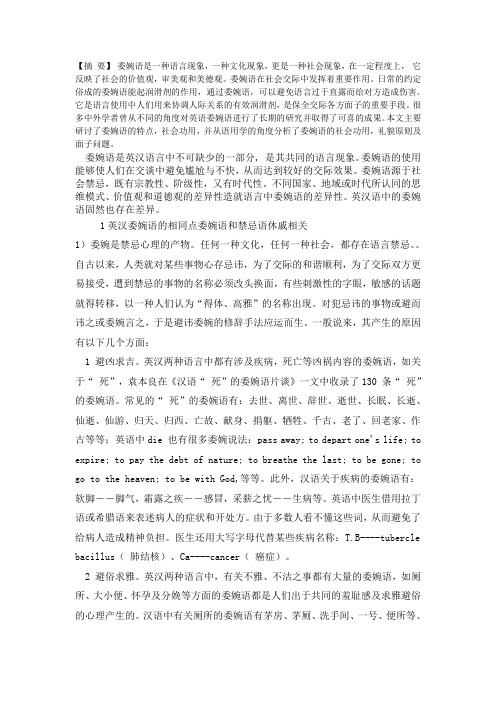
【摘要】委婉语是一种语言现象,一种文化现象,更是一种社会现象,在一定程度上,它反映了社会的价值观,审美观和美德观。
委婉语在社会交际中发挥着重要作用。
日常的约定俗成的委婉语能起润滑剂的作用,通过委婉语,可以避免语言过于直露而给对方造成伤害。
它是语言使用中人们用来协调人际关系的有效润滑剂,是保全交际各方面子的重要手段。
很多中外学者曾从不同的角度对英语委婉语进行了长期的研究并取得了可喜的成果。
本文主要研讨了委婉语的特点,社会功用,并从语用学的角度分析了委婉语的社会功用,礼貌原则及面子问题。
委婉语是英汉语言中不可缺少的一部分,是其共同的语言现象。
委婉语的使用能够使人们在交谈中避免尴尬与不快,从而达到较好的交际效果。
委婉语源于社会禁忌,既有宗教性、阶级性,又有时代性。
不同国家、地域或时代所认同的思维模式、价值观和道德观的差异性造就语言中委婉语的差异性。
英汉语中的委婉语固然也存在差异。
1英汉委婉语的相同点委婉语和禁忌语休戚相关1)委婉是禁忌心理的产物。
任何一种文化,任何一种社会,都存在语言禁忌。
自古以来,人类就对某些事物心存忌讳,为了交际的和谐顺利,为了交际双方更易接受,遭到禁忌的事物的名称必须改头换面,有些刺激性的字眼,敏感的话题就得转移,以一种人们认为“得体、高雅”的名称出现。
对犯忌讳的事物或避而讳之或委婉言之,于是避讳委婉的修辞手法应运而生。
一般说来,其产生的原因有以下几个方面:1 避凶求吉。
英汉两种语言中都有涉及疾病,死亡等凶祸内容的委婉语,如关于“死”,袁本良在《汉语“死”的委婉语片谈》一文中收录了130 条“死”的委婉语。
常见的“死”的委婉语有:去世、离世、辞世、逝世、长眠、长逝、仙逝、仙游、归天、归西、亡故、献身、捐躯、牺牲、千古、老了、回老家、作古等等;英语中die 也有很多委婉说法:pass away; to depart one's life; to expire; to pay the debt of nature; to breathe the last; to be gone; to go to the heaven; to be with God,等等。
委婉语的文化内涵

委婉语的文化内涵委婉语是一种非常普遍的语言现象,广泛存在于人类所有语言当中。
汉语委婉语具有丰富的文化内涵,在人们交流过程中起着至关重要的作用。
本文通过对汉语委婉语的文化意蕴和常用修辞进行分析,可以让人们了解语言现象背后的文化内涵并体会修辞在委婉语中的妙用,有助于人们在和谐友好的氛围下进行交流。
长期以来,学术界对汉语委婉语的研究主要集中在中外委婉语对比、委婉语语用和中外名著中委婉语研究等方面,总的来说,对汉语委婉语的研究还存在一些不足之处。
委婉语是人们在交际和交流中找到的一种合适的表达方式,即使双方可以顺利完成交际,又能使交际双方感到愉快。
随着社会文明程度不断提高,委婉语在人们生活中的使用频率越来越高。
在日常交流中,由于种种原因人们不乐意直截了当的表达某些事情或概念,这时便往往会换用一些容易被人们接受的、模糊的语言去代替它。
这样一来,既免去了直言其事给人们带来的尴尬和不适,又能美化语言,礼貌曲折的表达意思。
语言现象是人类社会普遍存在的一种现象,我们学习语言的目的便是为了与他人愉快而高效的进行交流。
要想与他人愉快的交流,适时适当地使用一些委婉语是非常有必要的。
我们知道,汉语委婉语与禁忌语有密切的关联,只有对禁忌语有了一定的了解,才能促使我们更加全面的认识和使用委婉语。
禁忌语是指人们在说话时,出于某种原因,不敢或不愿说出口的某些具有不愉快的联想色彩的词语,而以之代替的词语。
中华民族的禁忌语历史悠久,禁忌语的大量出现为委婉语的产生创造了非常有利的条件。
随着社会的不断发展,禁忌语已不能够满足人们之间沟通的需求,于是就出现了一些用含蓄的、委婉的词语代替了人们不愿提及的禁忌语,委婉语与禁忌语相辅相成,不断满足着人们的交际需要。
例如,“死亡”一词是中华民族非常典型的禁忌语之一。
自古至今,中华民族就对“死亡”之类字眼非常的忌讳,任何人都不愿意听到或提及它,于是就产生了大量表示“死亡”的委婉语——“见背”“归天”“仙逝”“去世”“辞世”等。
论文:委婉语
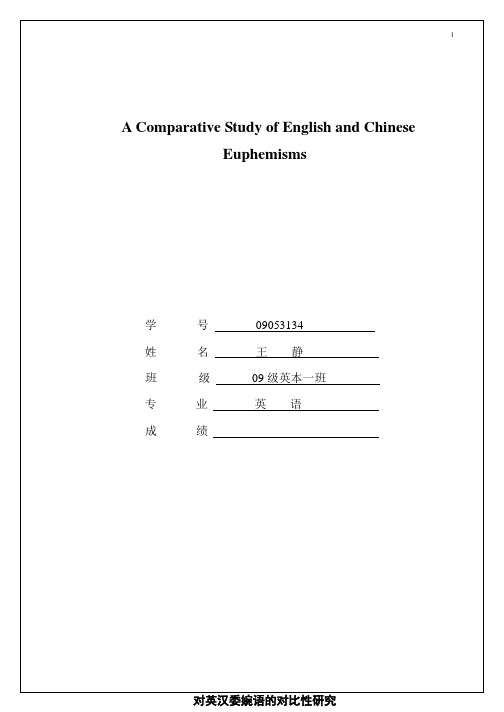
A Comparative Study of English and ChineseEuphemisms学号09053134姓名王静班级09级英本一班专业英语成绩对英汉委婉语的对比性研究摘要:委婉语是一种不用明说的、能够使人感到愉快或含糊的的说法代替具有令人感到不悦的含义或不够尊敬的表达方式。
委婉语这个词使用来自希腊,eu,意思是“好”或“听起来不错”。
pheme意味着说法。
字面意思是好的说法。
作为不可或缺的语言和自然的一部分,委婉语已引起了广泛兴趣。
因此,在其他研究者的基础上,本论文试图通过比较性研究委婉语与文化禁忌语的关系以及英汉委婉语的相似点和不同点,对英汉委婉语做一个全面的分析,旨在加深对委婉语的理解以及更好地在外语学习,跨文化交际以及我们的日常生活中使用它。
关键词:委婉语;相似性;差异;研究A Comparative Study of English and Chinese EuphemismsAbstract: Euphemism is mild, agreeable or, roundabout words use in place of coarse , painful or offensive ones. The term comes from Greek, eu meaning “well” or “sounding good ”. pheme means speech. Euphemism literally means good or pleasant speech. As an indispensable and natural part of language, euphemism has been arousing wide interest .Thus on the basis of others' researches, this thesis attempts to do a comprehensive analysis of English euphemism and Chinese euphemism by comparatively analyzing the relationship of euphemism with culture and taboos, and the similarities and differences of English and Chinese euphemism, aiming at deepening the understanding of the euphemism and to better use it in foreign language learning ,cross-cultural communication as well as in our everyday life .Keywords: euphemism; similarities; differences; analysisTable of contents1 .Introduction (1)2 A Brief Introduction to Euphemism (2)2.1A General Review of the Studies on Euphemism (2)2.2 Euphemism and Culture (3)2.3 Euphemism and Taboo (4)3 .Study on Euphemisms in English and Chinese (5)3.1 Comparison of Euphemisms in English and Chinese (5)3.2 Cultural Reasons for the Differences in Expressions (8)4 .Conclusion (9)Works Cited (11)1 .IntroductionEuphemism is the figure of speech which consists in the substitution of a word or expression of comparative favorable implication or less unpleasant associations instead of the harsher or more offensive one (Zhao 153). Politeness, as a symbol of human civilization, is a social、cultural as well as linguistic phenomenon that can be found in all languages and cultures. Euphemism is a strategy to achieve politeness in people’s daily conversation. Euphemisms, in a broad se nse, include all the ways of euphemistic expressions, such as words, phrases, sentences and discourses etc. In specific situation and context, even some nonverbal expressions can achieve the same effect as the verbal euphemisms.In the modern life, as a cultural phenomenon, euphemism is widely used more out of politeness than fear and the principles of politeness in west and east share something in common. Besides, English and Chinese euphemism is based on similar psychological factors: the psychology of pursuing beauty and self-defense. And dissimilarities or differences on cultural connotations in English and Chinese euphemisms exist, mainly focusing on the root of traditional culture and the value orientation. To be familiar with the linguistic features of euphemism in the target culture, to be aware of the differences between the target culture and the native culture and to interpret and use euphemism according to social context are keys to effective employment of euphemism in intercultural communication.2 .A Brief Introduction to Euphemism2.1A General Review of the Studies on EuphemismEuphemism is a common linguistic phenomenon in different cultures. Many scholars at home and abroad have made studies of euphemisms from different perspectives.British writer George Blunt advanced the term “euphemism” defining it as “a good or favorable interpretation of a bad word” .In 1983, American scholars J. S. Neaman&C.C. Silver published their book Kind Words, a Thesaurus of Euphemisms, which presents a detailed description on the history of euphemisms as well as deep discussions on that field. R.W. Holder’s A Dictionary of Euphemisms in 1995 illustrate euphemistic words and expressions with rich examples. Robert Burchfield’s view(2003), a language without euphemism would be a defective instrument of communication.The recorded study of Chinese euphemism dates back to Zhou Dynasty. As in the case of its English counterparts, ancient studies of Chinese euphemisms focus on the avoidance of certain names and of the folk customs at lexical level. A breakthrough is made by Chen Wangdao(1932) in his Introduction to Rhetoric. He extends the concept of euphemism to syntax or even discourse level. From the 1970s and the 1980s when foreign linguistic theories landed in China, Chinese linguists began to view euphemism from different perspectives: Chen Yuan(1932) makes a study from social linguistics, Wang Dechun(1995) makes a study from socialpsychological linguistics, Wu Liquan(2002) makes a study from culture and rhetorics, Shu Dingfang(1989) makes a study from pragmatics, Moreover, Zhang Gonggui (1996) compiled A Dictionary of Chinese Euphemisms.People in both languages have shared psychological foundations in the use of euphemisms. In Shu Dingfang’s view(1989), self-defense principle is fundamental in English and Chinese euphemisms. According to this principle, people tend to take their own social status and identity into consideration and try to protect self-benefits and honor. They use good words and expressions to talk about the things related to them instead of the vulgar ones. The achievements of predecessors left us abundant materials for reference and paved the way for us to study the subject more comprehensively.2.2 Euphemism and CultureEuphemism, as an indispensable part of every language, reflects customs, politics, life style and social psychology. For instance, we are sensitive about death, so “grave digger” was replaced by “undertaker”, later on “undertaker” was replaced with the Latinate “mortician”. And we are sensitive about bodily functions, so there are many euphemisms for “bathroom”. Learning Euphemism means learning to take the view as native speakers of that language, learning the ways their language reflects the ideas, customs, and behavior of their society.The relationship between euphemism and culture is too obvious now: Euphemism demonstrates its multiple mapping relations with culture; it varies withthe development of society, from one historical period to another. Understanding of the cultural Euphemisms enables us to catch the meaning conveyed.2.3 Euphemism and TabooA taboo is a strong social prohibition (or ban) relating to any area of human activity or social custom that is sacred and forbidden based on moral judgment and sometimes even religious beliefs. Breaking the taboo is usually considered objectionable or abhorrent by society. The primary examples of taboo words requiring the use of a euphemism are the unspeakable names for a deity, such as Persephone, Hecate, or Nemesis. In ancient Chinese, taboo is called quyu(曲语),referring to periphrasis or circumlocution, which means to speak the word indirectly, implying it without saying it. The appearance and the use of euphemisms are inevitably related to linguistic taboo.In ancient times, people had blind faith in ghosts and gods they respected. People whispered when they mentioned them. People even feared them so they did not dare to address their names directly. They believed it was profane to name gods. Therefore names of gods became the earliest taboos. To speak names of gods was to evoke the divinity whose power then had to be confronted. Societal taboos to a certain extent or to some people are the polarizing issues of sex, death, racism, genderism, ethnicity, nationality, religion, politics, money, socio-economic class, sexual orientation, disability and so on, which form the Euphemism.3 .Study on Euphemisms in English and Chinese3.1 Comparison of Euphemisms in English and ChineseEuphemism is a common linguistic phenomenon in different cultures. From the moment it is coined, it plays an important role in people's daily communication. It is not only a language phenomenon but also a culture one. To some extent, the euphemism generates from such circumstances of avoiding shame, of avoiding privacy and other psychological problems during interpersonal communication. Different cultures derive from different cultural backgrounds. Therefore, cultural differences would lead to the different uses of language.Taboo! Is the psychological basis of a euphemism. Some taboos in English and Chinese euphemism are same. For example: “death” is universally regarded as one of the taboos Death as the final outcome, whether ancient or modern, both the East and West, there are few differences. As a human being, regardless of whom he is and how he will be busy with his life, he must experience birth and death, young and old, finally, unveil them serious appearance to knock on the death door In Ch ina, People do not like the number”4”because they fear about the “die ”. Another group number is about“73 , 84”. Among old people , they think there are two key ages , if you are 73 or 84 years old , they believe that you will die before God of the hell invites you. So many old people are not willing to talk about their exact ages, if so they will shorten or prolong one year to overpass this two key ages.In western countries, people regard”13”as taboo. They never live No.13Room in the hotel, or not have the No 13 because of the religious belief. In most big hotels, there are not 13th story or No 13 Room. The Chinese said the death of euphemism: Deceased died! The death! Of old age!, Death! Sacrificed! The world long Speech! The heart stops beating! And see Marx! Furthermore, in ancient China, the uses of euphemisms of death are strictly classified according to different social ranks. Death of emperors is called“崩”, death of dukes”薨”, death of senior officials“卒”, death of Buddhist abbot “圆寂”, and death of the common “死”. English in the expression of death ,The euphemism of death! Depart from the world for ever, decease, breathe one last, pay one debt to nature, be with God, go the way of all flesh, etc. Recently, English euphemism of death more an more exaggerated, dead (The dead) became the deceased or the dear departed, dead! Is passed away, fallen asleep and gone to Jesus. This reflects that the people on death,in English, many euphemisms are used to fulfill this function. Some frequently used ones are “pass away” ,“depart” ,“pay one’s debt to nature” ,“go to better world”, “be with God”, etc. The same is true of Chinese euphemisms, which has“逝世”,“故去”,“寿终”,“作古”,“谢世”,“与世长辞”,“大限”,“去见马克思”and so on. Interestingly, English and Chinese culture also share a similar euphemism to express “death”. This one in English is “to go west”, in Chinese “西去”or“去西方了”( just means “go west”).The expression instead of the inconvenience straight. For example:(1) He is mentally ill (he had neuropathy.) Crazy! Do not insane or mad, if it is normal but can use: Are you mad (crazy)? (Are you crazy?)(2) Shi Tao: I secretly as people prepared. That thing (referring to Coffin) shall not be a good wood, and slowly do yet!I have had them secretly prepared. But I can not get any good wood for you know what, so I have let that go for the time being.!Good manners are produce euphemism the important psychological foundation. Taboo. is the unhappy things to avoid, polite, it is not the things of the withdrawal. The toilet of and the urine of euphemism and so on. For example, the toilet, in polite social, Chinese commonly used on the bathroom! Or a convenient, and euphemism says, English is commonly used in go to the men’ s (ladies’) room/rest Room/washroom/the John, or wash one s hands, relieve oneself, etc. Women pregnant! In Chinese euphemism has said the law's in trouble! Going to be a mom! And to upgrade! Etc; In English the wan committee view have big, with child, the begin Family way, expecting, etc. For example, the same word. ”wife ” has different calling toward different social classes. “天子之妻”called“后”,“诸侯之妻”called“夫人”, “大夫之妻”called“儒人”,“士之妻”called“妇人”, and“平民百姓”called really“妻”.In Chinese culture the word “old” is not an avoided one since there is a convention to respect and admire the old people. It has the connotation of “ enjoying high prestige and universal respect“. Therefore, in Chinese “老” is often used for addressing by adding. It at the end of the surname for expressing respect to the old people, such as “王老“,“李老” , etc.In western society, the issue of “old age ”is too sensitive to be mentioneddirectly. People try all means to avoid using the word “old” in daily life, instead they adopt many other pleasant words to replace this sensitive word. For example, they use “home for adult” for “old people’s home”, “an adult community” for “a community for old people”, and “senior citizen” for “old man”. He is not old but “longer living”, and he is not “a candle in the wind” but “in golden years”. He is also promoted to “elderly”, “mature” ,“an adult”, “a distinguished gentleman ”, “feeling one ’s age ”or “third age”. Reward the ability of some help. The psychological basis of its different tables , Now in the form, we from found in English language differences, and further analysis of the English literature, literary Kam Foundation. Differences in two different languages, English lead to English. The euphemism different performance form, which is reflected in the words and sentences type operation and with peers surface. Contrast to the Han English euphemism language. Wanyou Li, sound to not Ear-piercing. Theword Language-generation. For order people do not fast, Lu no Ceremony crude. It sounds harsh words. Avoid tabooand ritual appearance is produced Health euphemism language of the heart reason. In summary, the basic characteristics of the euphemism is delightfully.3.2 Cultural Reasons for the Differences in ExpressionsDifferent natural environments undoubtedly have a great impact on bringing forth different living habits of people and further bringing forth different cultures andcharacters. These differences help shape diversified expressions. Death euphemism is one of the representatives.Many scholars agree that eastern culture is a shame culture expecting the approval of others and the western culture is a guilt culture attaching great importance to self-identity.The thinking of people may be recorded in written materials or expressed in verbal language. What they say and what they write reveal how they think. Death euphemisms also reveal these differences. Their different thinking modes are reflected in their attitudes towards nature and social life. Their attitudes are also reflected in the language they use. Thus, varied death euphemisms come into being. Different aesthetic mental sets reflect people’s different understandings of the world. Different communicative values in English and Chinese cultures lead to different psychological inclinations;4 .ConclusionIn order to show the similarities and differences of cultural connotations, the present comparative study of English and Chinese euphemisms focuses on the analysis of the cultural roots with the examples mainly restricted to the lexical or phrasal level. Due to the limitation of resources, it just focus on typical expressions to illustrate the cultural connotations. And points out the similarities and differences between Chinese and western Euphemisms from the perspective of cultural. Althoughthe present study attempts to cover a wide range of the cultural points in the statement of comparison, it is still limited in terms of depth of research. All these limitations above may serve as the motivations for further study. Therefore in learning and using language, people should focus our attention on the acquisition of cultural knowledge for the sake of better communication. Learning how to use euphemisms on different occasions and understand the western and the Chinese culture, also has a profound and realistic effect on effective cross-cultural communication.Works CitedAllan, K.&K. Burridge. (1991). Euphemism and Dysphemism. Oxford: Oxford University press.Ayto, J. (1993). Euphemisms. London: Bloomsbury Publishing Limited.. Ayto, J. (1994). Times Euphemisms. Singapore: Federal Publications.. Kramsch, C. (2000). Language and Culture. Shanghai: Shanghai Foreign Language and Education Press.Neaman.Judith&Silver Carole. (1991). A Thesaurus of Euphemisms.World Publishing Corp, (1): 67.Rawson, Hugh. (1981). A Dictionary of Euphemisms and other Doubletalk. New York: Crown Publishers, Inc.Robert Burchfield. (2003). The English Language. Oxford: Oxford University Press.范家材. 英语修辞格赏析 [M ].上海: 上海交通大学出版社, 1992江希和. 现代英语中的委婉语 [J ]. 现代外语, 1983 (3): 14-19.刘纯豹. 英语委婉语词典 [M ]. 南京: 江苏教育出版社, 1996.李国南. 英汉修辞格对比研究[M ]. 福州: 福建人民出版社, 1999.潘绍嶂. 英汉修辞与写作[ M] . 上海: 上海交通大学出版社, 1998.束定芳. 现代汉语中的委婉语[J ]. 汉语学习, 1989 C2: 4-38徐海铭. 委婉语的语用学研究[M ]. 外语研究,1996 (3): 21-240.。
委婉语认知语言学分析

委婉语认知语言学分析摘要:范畴化理论是认知语言学的基础,本文试图从委婉语的认知理据出发,用原型范畴理论及其延伸―概念隐喻对委婉语进行分析,以期加深对委婉语的理解及更好地运用。
关键词:委婉语;原型范畴;隐喻オ引言委婉语一词源于希腊,原意是“说的好听些的话”。
委婉语在英语中称为“euphemim”。
从词源上看,前缀-eu意为good,pleaant;词干-pheme意指peech。
由此可以推断,委婉语就是goodorpleaantpeech。
委婉语最主要的特征就在于运用比较抽象、模棱两可的概念或比喻的、褒义化的手法,使谈话双方能够采用一种比较间接的方式来谈论不宜直说的事,而且不必为谈论这些事感到内疚、不会为此感到窘迫。
(郑立信,2002)由于委婉语不仅涉及到人类的认知心理,还涉及到其使用的认知语用策略,其根本实质和内在委婉运作机制也就显得更为复杂。
传统的研究主要是在传统符号语义学和语用学的基础上进行的。
这些研究试图从委婉心理的角度解释委婉语的构成基础和运作机制,但由于它们把作为认知主体的人的认知能动性排除在外,因此进展不大。
正因为委婉语的委婉意义并不是符号本身的直接所指,它涉及到人对委婉语的认知过程,排除人的认知因素便不能揭示其实质。
然而,20世纪80年代,认知语言学的飞速发展,为进一步科学地解释委婉语提供了有力的理论依据。
笔者试图在前人的研究基础上,从认知语义范畴,概念隐喻等方面着手,探究委婉语的认知理据,以期加深对委婉语的理解,促进对它的应用。
一、委婉语的认知理据认知语言学认为,大脑对事物的认识不是杂乱无章的,而是以有效的方式,经过认知加工,对千变万化的事物进行分析、判断、归类,在此基础上将其分类和范畴化。
人们对世界的认知过程也就是对世界万物概念化和范畴化的过程。
而对事物范畴化的结构反映在语言中,语言的意义就在于人类如何对世界进行概念化和范畴化。
传统范畴理论的基本假设是:范畴是由某些必要和充分的特征决定的。
委婉语定义内涵及美学价值

委婉语的定义内涵及美学价值摘要::英、汉委婉语频繁应用于日常交往以及古今文学作品、报刊杂志中。
研究者们普遍认为,英语委婉语和汉语委婉语是两种语言中完全对等的修辞手法。
但语言是思想的载体、是社会文化的镜子,作为语言的一种表达方法,委婉语必定体现文化的内涵,具有民族特征。
本文对比了英汉委婉语的定义内涵,认为英汉委婉语的侧重点不同,英语委婉语强调“关爱”的内涵。
委婉语的使用正是用一种恰当的方式来谈论不宜直言的人或事物,从而给人以美感,因而委婉语具有独特的美学价值。
关键词:委婉语定义内涵美学价值中图分类号:h059 文献标识码:a一委婉语的定义内涵在日常语言交际中,特别是在某种特定的语境中,人们为了避免引起不快、减轻交际压力,对某些概念或事物总是避免直接提及;谈论到某些话题或使用某些词语时,大都采取不同程度的“回避”,以避免引起不快、不满或有可能损害感情或关系的语言。
为了达到表达思想,交流信息的目的,人们就采用迂回曲折的方法,使用一些模糊或听起来顺耳、令人愉快、彬彬有礼的词语。
这种语言现象就是委婉表达法。
英汉语中都有大量的委婉语。
研究者们普遍认为,英语委婉语和汉语委婉语是英汉两种语言中完全对等的修辞手法。
但语言是思想的载体、是社会文化的镜子,作为语言的一种表达方法,委婉语必定体现文化的内涵,具有民族特征。
因此,英语委婉语和汉语委婉语都不可避免地打上各自的文化烙印,具有不同的文化内涵。
英语和汉语中的委婉语确系两种语言中的同一修辞手段,这可以从英汉辞书对委婉语的定义中看出,但相比之下汉语委婉语的涵义更为宽泛。
1 英汉委婉语的侧重点不同一般情况下,英语委婉语强调使用单词或短语来代替原来的表达用语,而汉语则强调用曲折含蓄的话语来代替或烘托暗示原意。
也就是说,汉语委婉语可以用词语、短语替代,也可以是语句来烘托暗示。
从表层结构看,有的汉语委婉语包含更多的词语,用于文学作品中更有短话长说的特点。
从语义内涵看,汉语委婉语表层意思与深层意思距离更大,显得更为委婉曲折。
浅析汉语委婉语的心理基础

浅析汉语委婉语的心理基础" 论文关键词:汉语委婉语禁忌礼貌原则论文摘要:委婉语作为一种语言现象,有其独特的交际功能,蕴涵着一个民族丰富的文化内涵,展现出交际主体的心理。
本文对汉语委婉语的产生心理作了浅显的探讨,认为主要是内容的禁忌和表达中的礼貌这两种心理在起作用。
一、委婉语的定义委婉语(euphemism)一词源于希腊语,意为“谈吐优雅”。
它就是“通过一定的措词把原来令人不悦的或是比较粗俗的事情说得听上去比较的得体、比较的文雅。
其方法是使用一个不直接提及事情不愉快的侧面的词来替代原来那个包含令人不悦的内涵的词”¨。
在这一定义中,委婉语包含两方面的内容,一是说什么,二是怎么说,简单地说就是怎么使交际得以愉快的进行。
其实,这样看来委婉语产生的基础就不外乎是心理因素了,其他的如文化、风俗等都是迎合心理因素而产生的。
二、汉语委婉语内容上的禁忌性研究委婉语,就不得不提到禁忌语(taboo或tabu,即塔布)。
禁忌是委婉语产生的主要心理因素。
世界上任何一种文化任何一个社会都存在着许多语言禁忌,“在多数语言中,涉及死亡、性和生殖、排泄等内容的词语往往在禁忌语之列”,这就要“用相应的委婉语来代替禁忌语”彻。
禁忌语的出现给人与人之间的交际造成困难,因为在不少情况下,某些遭禁的内容是无法逃避的,这就逼迫人们用另一种方式去表达那些被禁忌的东西,于是委婉语便应运而生了。
汉语委婉语也是如此。
(1)对崇高神圣事物的禁忌。
人们对某些人、某些事物特别崇拜,认为直称他或它的名称是大不敬的行为,因此必须形成禁忌。
避讳就是一例,对尊者、长者等不能直呼其名,哪怕是读音有点相近也应当回避。
比如,王嫱字昭君、为避晋文帝司马昭之讳,改称明君或明妃。
唐太宗李世民,为了避讳,一般情况下,唐人行文用“代”代替“世”字,用“人”代替“民”字,观世音因此而略称观音,民部改称“户部”。
在古代文献中,这类汉语委婉语比比皆是。
" (2)对危险恐怖神秘事物的禁忌。
英语委婉语研究

英语委婉语研究英语委婉语 (euphemism)是英语语言中一种独特而微妙的现象,它在人际交往中扮演着重要的角色。
通过使用委婉语,人们可以避免直接表达可能造成冒犯、尴尬或敏感的话题,从而维护人际关系的和谐与融洽。
本文将从以下几个方面对英语委婉语进行探讨和研究。
英语委婉语的起源可以追溯到古希腊和罗马时期,当时人们使用委婉语来避免直接提及神或死亡等敏感话题。
随着时间的推移,英语委婉语逐渐扩展到各个领域,包括政治、商业、医学和社交等。
在当代社会,英语委婉语的使用已经变得极为普遍,而且在一些特定领域和情境中,委婉语的使用已成为一种文化习惯和礼貌准则。
英语委婉语的主要特点包括间接性、模糊性和礼貌性。
间接性指委婉语不直接表达真实意图,而是通过暗示、比喻或其他修辞手法间接表达。
模糊性指委婉语的含义往往不够明确,可以适用于多种情境和解释。
礼貌性指委婉语的使用可以减轻直接言语可能造成的冒犯或尴尬,从而保持人际交往的和谐。
委婉语的主要功能包括:1)避免冒犯他人或引起冲突;2)掩饰真实意图或事实,减轻言语的直接冲击;3)维护自我形象或团体形象,避免被他人视为粗鲁或无礼的人;4)遵守社会和文化规范,维持人际关系和特定情境下的交际需要。
英语委婉语的表达方式多种多样,主要包括以下几种:借词:使用与原词相近或相关的词汇来代替直接表达。
例如,“to pass away”代替“to die”,“to go to sleep”代替“to die”。
修饰词:在原词前加上修饰词或形容词来弱化语气或改变含义。
例如,“accidental death”代替“death by accident”。
比喻:使用比喻来间接表达难以启齿或敏感的话题。
例如,“in the arms of Morpheus”代替“asleep”。
抽象概念:用抽象概念来代替具体事物,以减轻直接冲击。
例如,“a necessary evil”代替“war”。
否定表达:通过否定来减轻肯定的含义。
委婉语及其翻译论文
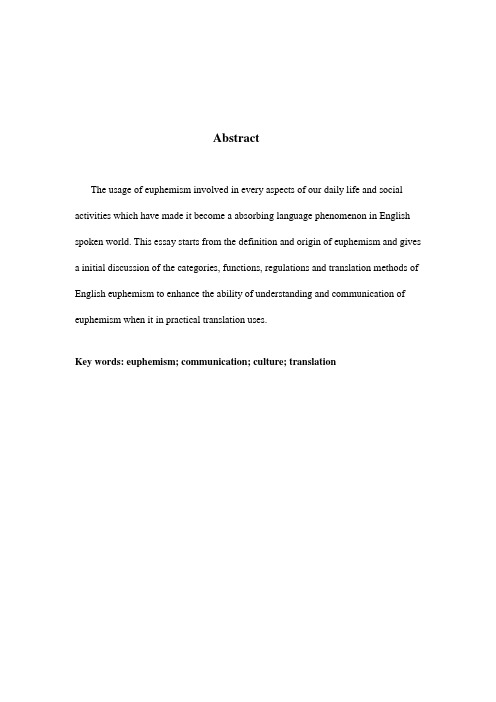
AbstractThe usage of euphemism involved in every aspects of our daily life and social activities which have made it become a absorbing language phenomenon in English spoken world. This essay starts from the definition and origin of euphemism and gives a initial discussion of the categories, functions, regulations and translation methods of English euphemism to enhance the ability of understanding and communication of euphemism when it in practical translation uses.Key words: euphemism; communication; culture; translation摘要委婉语使用的范围涉及社会及个人生活的方方面面,成为英语世界中一个引人注目的语言现象。
本文从委婉语的定义和起源入手,对英语委婉语的分类、功能、规律及其翻译方法做了初步探讨,以期达到在实际翻译工作中加强对委婉语的理解和交流之目的。
关键词:委婉语;文化;交流;翻译I. IntroductionAs a rhetorical device, Euphemism had been widely used during the Victorian period which is a fashion in the upper class at that time. And even nowadays the usage of euphemism has increased and brought some new changes, making people impact their eyes imappearance of sorts. For example, she is pregnant has different expression according to different ages.1.She has canceled all her social engagement.(1856)2.She is in an interesting condition.(1880)3.She is in a delicate condition.(1895)4. She is knitting little bootees.(1990)5.She is in a family way.(1920)Also, the range of the usage of euphemism is constantly widening and involving numerous aspects in our daily life which makes it become an inevitable lingual phenomenon in the English world. However, the comprehensive uses of euphemism in English has brought a big challenge to translator whose mother tongue is not English to understand and express those euphemism. This essay begins with the definition and origin and further discuss the categories, functions, principles and translation method in order to gain a better understanding and communication in practical use of euphemism. Actually, it is not only English spoken countries have the usage of euphemism but also in many other languages. But this essay only put the main part in English spoken countries.II. The Definition and Origination of EuphemismThrough euphemism, we replace, override, and reinvent reality by the magic of language (Stein, 1998, p. 8). Euphemism is about how we humans devise deliberately slippery language to justify to ourself and to others, if not to impose on them, the degradation of categories of people, if not the literal extinction of their lives (Stein, 1998, p. 7). Euphemism is the substitution of a mild, indirect, or vague expressio n for an offensive or unpleasant one (Wilkes, 1979, p. 123). Euphemism is not a footnote but part of the main text of organizational life. It is the key to unlock the well-kept secrets of organizational behavior, of bureaucracies and, of people in communities. It is a figure of intentionality and, concurrently, a distraction from that intentionality (Stein, 1998, p. 4). Euphemism recloaks the bad as being good. Things are not what they seem, but what we need them to seem. Euphemism makes masking into an obscenely fine art. We are commanded to believe uncritically that things are only what they seem (Stein,1998, p. 4). The definition of euphemism in The Encyclopaedia Britian is “Figure of speech in which something of unpleasant, distressing or indelicate natu re is described in less offensive term”. Namely, many things are never openly said but use an vague way to entertain people by avoiding those unpleasant and disrespect expressions. Euphemism stems from emphemismos in Greek and its prefix “Eu”means good and the stem“phemism” means “speech”. So the whole meaning is "good speech". Greeks shown great worship and admiration to natural power and sometimes even felt confused which made them prefer to say some good speeches, euphemism, when they conducted sacrifices. That is the direct reason that euphemism is produced. Later on, the Greek civilization has been spreaded to worldwide, giving a great impact on Europe and America countries. Therefore, euphemism has been widely developed in Europe and America areas. The range of the uses have expand from religious area to many aspects of humans' daily life. Generally speaking, euphemism includes the avoidance of taboos, sensitive words and usage of implications and circuity.错误!未找到引用源。
英语专业关于委婉语定义的毕业论文
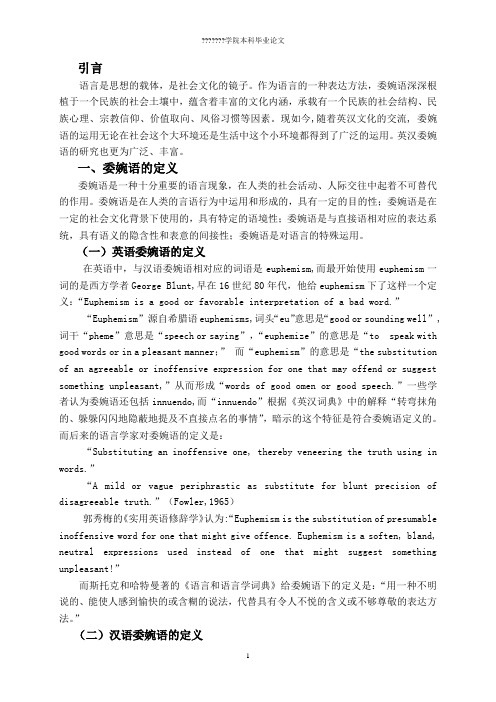
引言语言是思想的载体,是社会文化的镜子。
作为语言的一种表达方法,委婉语深深根植于一个民族的社会土壤中,蕴含着丰富的文化内涵,承载有一个民族的社会结构、民族心理、宗教信仰、价值取向、风俗习惯等因素。
现如今,随着英汉文化的交流, 委婉语的运用无论在社会这个大环境还是生活中这个小环境都得到了广泛的运用。
英汉委婉语的研究也更为广泛、丰富。
一、委婉语的定义委婉语是一种十分重要的语言现象,在人类的社会活动、人际交往中起着不可替代的作用。
委婉语是在人类的言语行为中运用和形成的,具有一定的目的性;委婉语是在一定的社会文化背景下使用的,具有特定的语境性;委婉语是与直接语相对应的表达系统,具有语义的隐含性和表意的间接性;委婉语是对语言的特殊运用。
(一)英语委婉语的定义在英语中,与汉语委婉语相对应的词语是euphemism,而最开始使用euphemism一词的是西方学者George Blunt,早在16世纪80年代,他给euphemism下了这样一个定义:“Euphemism is a good or favorable interpretation of a bad word.”“Euphemism”源自希腊语euphemisms,词头“eu”意思是“good or sounding well”,词干“pheme”意思是“speech or saying”,“euphemize”的意思是“to speak with good words or in a pleasant manner;”而“euphemism”的意思是“the substitution of an agreeable or inoffensive expression for one that may offend or suggest something unpleasant,”从而形成“words of good omen or good speech.”一些学者认为委婉语还包括innuendo,而“innuendo”根据《英汉词典》中的解释“转弯抹角的、躲躲闪闪地隐蔽地提及不直接点名的事情”,暗示的这个特征是符合委婉语定义的。
委婉语认知机制的多重论证
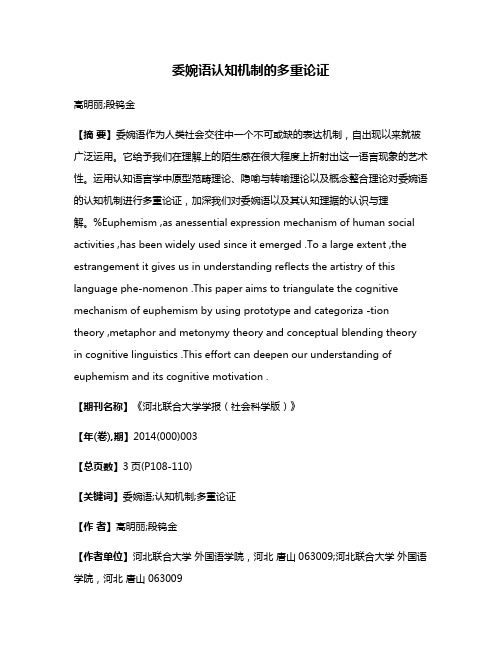
委婉语认知机制的多重论证高明丽;段钨金【摘要】委婉语作为人类社会交往中一个不可或缺的表达机制,自出现以来就被广泛运用。
它给予我们在理解上的陌生感在很大程度上折射出这一语言现象的艺术性。
运用认知语言学中原型范畴理论、隐喻与转喻理论以及概念整合理论对委婉语的认知机制进行多重论证,加深我们对委婉语以及其认知理据的认识与理解。
%Euphemism ,as anessential expression mechanism of human social activities ,has been widely used since it emerged .To a large extent ,the estrangement it gives us in understanding reflects the artistry of this language phe-nomenon .This paper aims to triangulate the cognitive mechanism of euphemism by using prototype and categoriza -tion theory ,metaphor and metonymy theory and conceptual blending theory in cognitive linguistics .This effort can deepen our understanding of euphemism and its cognitive motivation .【期刊名称】《河北联合大学学报(社会科学版)》【年(卷),期】2014(000)003【总页数】3页(P108-110)【关键词】委婉语;认知机制;多重论证【作者】高明丽;段钨金【作者单位】河北联合大学外国语学院,河北唐山063009;河北联合大学外国语学院,河北唐山063009【正文语种】中文【中图分类】H313委婉语(euphemism)一词起源于希腊语‘euphemos’意为‘good or fortunate speech’,前缀‘eu’意指‘good’,词干‘phemos’或‘phemism’的意思是‘speech’。
委婉语论文

委婉语论文委婉语是指通过巧妙选择措辞和用词来传递信息、表达意思的一种语言表达方式。
委婉语在论文写作中也起到了重要的作用,可以帮助作者更加客观、谦虚地表达自己的观点和结论。
本篇论文将探讨委婉语在论文中的应用情况及其对文章的效果影响。
首先,委婉语在论文中的应用主要集中在表达个人观点和结论时。
在论文中,作者可能需要对前人研究成果进行评价或提出自己的见解。
在这种情况下,使用委婉语可以减少冲突和争议,更好地传达作者的意图。
例如,作者可以使用“可能”、“似乎”、“据推测”等词语来表达对某个观点的怀疑或不确定性。
通过这样的用词,作者可以保留自己的反驳余地,同时也不会给读者直接施加观点。
其次,委婉语还可以用于表达推论和结论的强度。
作者在论文中往往需要给出结论或总结性陈述,但有时直接陈述可能显得过于绝对或武断。
在这种情况下,使用委婉语可以减弱陈述的冲击力,使结论显得更为客观和温和。
例如,作者可以使用“可能性较高”、“很可能”、“有充分的理由认为”等词语来表达结论的强度,更贴切地传达自己对事实的把握程度。
此外,委婉语还可以用于谦逊地表达自己的成果和贡献。
在论文中,作者可能需要介绍自己的研究成果、方法或创新之处。
此时,使用委婉语可以避免过于自夸或自吹自擂,展现出作者的谦虚和客观态度。
例如,作者可以使用“据我们所知”、“我们认为”等词语来表达自己对研究结果的理解和看法,以免过于夸大其词。
总之,委婉语在论文中的应用有助于作者更好地传达观点和结论,减少冲突和争议,提高文章的客观性和谦虚性。
然而,过度使用委婉语也可能导致表达模糊和不明确,因此在使用中需要谨慎把握。
未来的研究可以进一步探索委婉语在不同学科领域和文化背景下的应用情况,以及委婉语使用对读者理解和接受论文的影响程度。
委婉语论文.doc

英汉委婉语现象的成因与表现对比摘要:英汉两种语言都有大量的委婉语,具有颇多相似处。
但因其属于不同语系、不同的文化传统、不同的历史背景等因素,它们在委婉语方面的差别尤为明显。
本文将对英汉委婉语成因及表现进行对比分析,使大家更好的了解英汉着两种语言中委婉语的不同,如果我们掌握了他们,就能够在日常生活特别是在跨文化交际中,提高我们的交际能力。
关键词:英汉委婉语成因表现对比引言使用委婉语是世界各个民族语言的一种普遍现象。
委婉语的基本特征就是用一种令人愉快的、委婉有礼的、听起来不刺耳的词语来代替令人不快的、粗鲁无礼的、听起来刺耳的词语。
英汉两种语言都存在着大量的委婉语。
这两种语言中的委婉语在表达形式以及所蕴涵的文化内涵既有相同之处,也具有很大的差异。
本文试从“生理现象”方面几种主要委婉语的表现形式和文化内涵进行对比分析,以期加深对英汉两种语言文化的了解。
汉语委婉语的成因1、汉语中最早的委婉语是随禁忌语的出现而产生的,如果不需要禁忌,许多委婉语也就失去了存在的必要。
正是禁忌语的存在,刺激委婉语的产生,促进其数量的扩大。
自古以来我们最忌讳的就是一个“死”字,一般会借用其它的词语委婉含蓄地来表达。
据调查,汉语中关于“死”的委婉语有上百种之多。
中国古代封建等级制度森严,对不同人的死有不同的称法:“天子死曰崩,诸侯死曰薨,大夫死曰卒,士死曰不禄,庶人死曰死”《礼记•曲礼》。
僧尼去世的婉称一般有“涅磐、圆寂”;道徒去世的婉称有“遁化、羽化、”;未成年去世称:“夭折、夭亡”;年轻女子去世称“香消玉碎、香消玉殒”等;为正义事业而亡称之为“捐躯、牺牲、阵亡、就义”。
委婉语实质上是禁忌语的变体,担负着润滑交际的任务。
2、与人交流创造一个宽松和谐的氛围是必要的,有些敏感性、刺激性的字眼不得不提时,为了对方更易接受,需说得文雅含蓄一点,这是委婉语产生的第二个原因。
在《战国策•齐策》中有这样一段话:“后基年,齐王谓孟尝君曰:…寡人不以先王之臣为臣。
英语中的委婉语-英语委婉语论文-英语论文

英语中的委婉语-英语委婉语论文-英语论文英语中的委婉语-英语委婉语论文Communicative Function of English EuphemismAbstractEuphemism is a common phenomenon when people use language, which is not only a social language phenomenon, but it is also a cultural phenomenon. We all need to communicate in our daily life or in diplomacy. However, because of the difference of life habit or custom and the taboo of different culture, we must learn to use Euphemism to avoid embarrassment or unhappiness. Therefore, through linguistic facet, this paper tries to research into communicative function of English Euphemism in certain language condition by special examples. Only when can we know how to make use of Euphemism in different background and environment, we can use the proper Euphemism to minimize hurt to people and to achieve the purpose of effective communicative Euphemism reflects all kinds of social mentality and social communicative function. Euphemism is also widely used in every field, so it is good for us to study English and do effective multi-cultural intercommunication.Key words: euphemism; function; taboo; intercommunication摘要委婉语是人类使用语言过程中的一种普遍现象。
- 1、下载文档前请自行甄别文档内容的完整性,平台不提供额外的编辑、内容补充、找答案等附加服务。
- 2、"仅部分预览"的文档,不可在线预览部分如存在完整性等问题,可反馈申请退款(可完整预览的文档不适用该条件!)。
- 3、如文档侵犯您的权益,请联系客服反馈,我们会尽快为您处理(人工客服工作时间:9:00-18:30)。
委婉语认知理据论文
摘要:委婉语作为一种特殊的文化现象,也是一种修辞手法,是协调人际关系的重要手段,本文主要从语义和语用的角度探究委婉语的形成来源,认知理据,委婉语的分类及语用功能。
关键词:委婉语委婉语的认知理据语用功能
语言是社会文化的载体和组成要素,作为一种社会现象,语言也是社会交往和实践的产物,其中委婉语是社会心理在语言上的一种反映,从诞生之日起委婉语就带上了鲜明的社会心理特征,与时代精神息息相关。
我们在学习和生活中,常常会碰到大量的委婉语。
随着人们外部交流的日益扩大,不同文化背景的人们如果不能真实地掌握委婉语所反映的内在含义,交流障碍或信息误解会随时发生。
为了避免在跨文化交际中的语用错误,理解委婉语是十分必要的。
英文里的“euphemism”一词源于希腊语,词头“eu”的意思是“good”(好的),词干“phemism”的意思是“speech”(言语),整个字面意思就是“word of good omen”(好的说法)。
在人们的日常言语交际中,委婉语是维系人们社会关系的重要手段,也是人们交际的需要。
1 委婉语的形成来源
委婉语的使用是从“避讳”开始的,起源于语言灵物的崇拜。
当人们不愿说出禁忌的言辞可又不得不表明这种事物时,就得用人们更加乐于接受的语言来表达。
早在人类文明的早期,委婉语就已经发源了,那时社会文明程度很低,人们都崇拜神灵鬼怪,与此相关
的词就成为了语言禁忌(taboo)。
而在现代文明高度发展的今天,人们又极度害怕“贫困”,“年老”及“死亡”等,因此一大批委婉语就应运而生了。
委婉语产生的第一个原因是出于礼貌。
在交际过程中,说话人觉得某些事情难以启齿,直接讲出来又怕有损自己的形象或引起双方的尴尬,就采用委婉的方式来指明事物,这样双方都可以接受。
另外政治上的需要也是委婉语产生的一个原因。
政治界尔虞我诈,为了粉饰和伪装现实,大量地使用委婉语。
2 从语义学角度看委婉语产生的认知理据
英文中有大量的委婉语,表现形式也是丰富多彩的,委婉语在一定程度上反映了英美国家的社会文化心理。
正确地学习和使用委婉语,有必要清楚地掌握委婉语的认知理据,这样才能清楚人们会话时的交际心理,潜在内涵和真实意图。
谈到委婉语的认知理据时,在《辞格与词汇》一书中,李国南教授是这样精辟论述的:从委婉语的产生原因来看,它源于人类文明早期“语言灵物的崇拜”,而“语言灵物的崇拜”的心理基础,是将“语言符号”等同于“所指对象”。
根据Ogden和 Richard提出的语义三角理论,意义与指称之间并没有直接的联系,而是通过大脑的概念而间接联系起来的。
但只要这种间接联系一旦在人们的头脑里根深蒂固起来,就会成为一种“约定俗成”。
换句话说,人们一遇到某个符号或意义,会马上想起它所指的事物,而委婉语的特点在于曲折地表现这种语义方式。
(如图)S1为禁忌语,S2为委婉语,由S1,S2,R(所指)与T(思维)构成两个三角形,也就是说首先必须由S2通过T跟S1
联系,而后再由S1通过T与R建立联系。
(李国南,2001:246)。
于是意义与所指之间的联系就多了一层曲折,从而达到了委婉的目的。
李国南教授是从符号学的角度出发,将委婉语的运行机制与语义学中的语义三角联系起来,这样加深了对委婉语产生的认知心理的理解。
3 从语义学的角度看委婉语的分类
作为封闭性的语符系统,语言是借助于意义与外部现实产生接触而发挥功能的。
委婉语则是用褒扬或是曲折的言辞来表达被言语禁忌的事物。
从语义学的角度,委婉语可以分为积极性委婉语和消极性委婉语。
积极性委婉语是指为不使别人为难或为体现对对方的尊重,在提到别人的缺点,生理缺陷,年龄等方面往往用委婉语来替代。
比如说?“retarded”指智力低下,但它又带有很深的贬义,一般用来描述弱智儿童,而现在通常用“special”来替代“retarded”,这样听起来容易使人接受。
消极委婉语是指用在官僚政客当中的用以掩盖歪曲事实真相,以达到混淆视听,以假乱真的目的。
(李常磊,2000:114)。
比如说在美国20﹑30年代经历了前所未有的经济危机,政客们把“economic crisis”(经济危机)委婉地说成是“depression”(萧条),“slow down”(减速,指经济衰落)“adjustment downward”(向下调整,指经济不佳)。
4 委婉语的语用功能
4.1避讳功能
言语禁忌是一种普遍的文化现象,始于对不可理解和令人畏惧的世界的神秘感。
无论是对神的敬畏,对妖魔鬼怪和病痛死亡的畏惧,对人的生殖器官和行为以及贫困卑贱的羞惭感,无一不是因其神秘莫测和难以理解而产生的。
死亡是可怕的,同时也是忌讳的,有关死亡的委婉语是屡见不鲜的。
当谈及死亡时,人们就采用委婉语来达到避凶求吉的目的,因此,英美国家的人常用“pass away”,“pass out”,“close one’s day”,“fall asleep”,“go to a better world”,“be in heaven”,“go to his long home”,“pay one’s debt to nature”,“be with God” etc来表达死亡。
死亡是最可怕,最忌讳最不愿意提及的话题,西方人把它说成是睡着,去了天堂和上帝在一起,这样就减轻了听者的心理刺激和压力,使人容易接受,以达到交际的目的。
(冉明志,刘盛明,2005:42)。
4.2避俗求雅功能
不论古今中外,生理排泄及性都属于禁忌的范围,对涉及它们的词语都用委婉语来取代,以使听者不必为此感到窘迫,达到求雅的目的。
在表达有关性的话题时,英美国家喜欢用“go all the way”,“have relations with”,“go to bed with”,“to do it” 等相关含蓄的表达法来暗指性行为。
在说到生殖排泄时,英美国家常用“to pass air”,“to let a breeze”,“to make a noise”,“to wash one’s hands”,“to make water”,“to make oneself comfortable” etc 来表示。
性及生理排泄在
东西方社会文化中历来都被视为不雅之事,在言语交际中为礼貌起见,避免损及对方,尽量避免直接使用,所以无论在任何文化中,人们总是寻求一些不伤及感情的或中性的词汇来表达它们。
